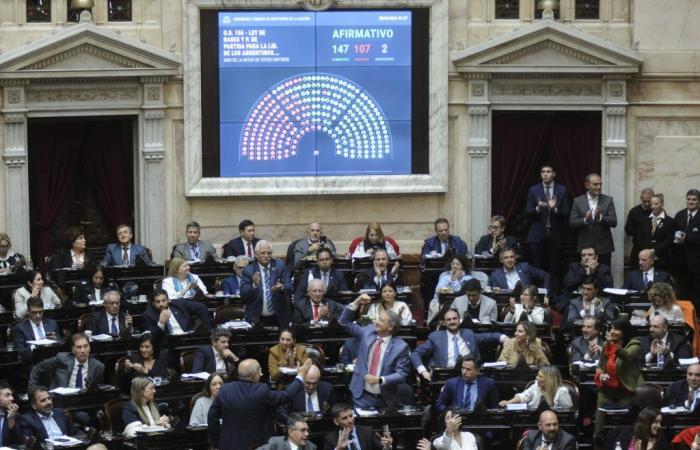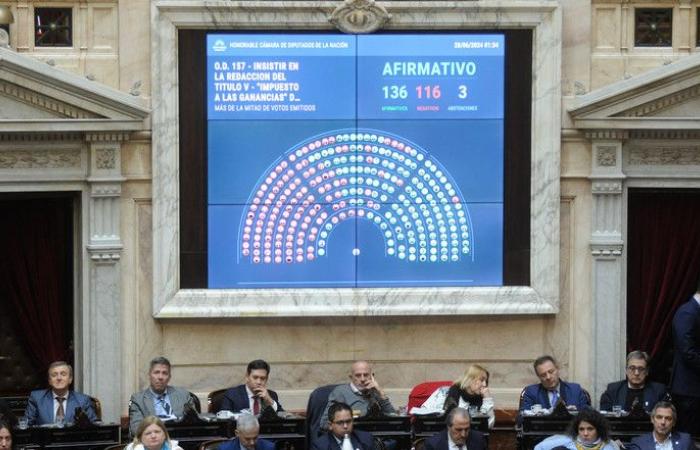The Chamber of Deputies approved in the first minutes of this Friday the Ley Bases, which had already been discussed at the end of April and in which the Senate later introduced changes. The project, key for the government of Javier Milei, received 147 votes in favor, 107 against and 2 abstentions. They also approved chapters of the fiscal package: Return of Income Tax It was passed with 136 votes in favor, 116 against and 3 abstentions.
The session began this noon, after 12:30. But the debate on the Base Law was preceded by nearly three hours of privilege issues.
The government was expected to have the necessary votes, after weeks of negotiations with opposition deputies and after winning the majority vote in the plenary session of the committees on Tuesday. It was anticipated that 147 legislators would vote in favor of the omnibus law. And that was the number with which the first measure approved by Milei’s government came out.
The Ley Bases was unanimously supported by the legislators of La Libertad Avanza (LLA). It was supported by allies and sectors of the dialoguing opposition: the PRO, the MID (an offshoot of LLA), the Unión Cívica Radical and almost all of the Coalición Cívica and almost all of Hacemos Coalición Federal, the block led by Miguel Pichetto.
The Independencia bloc, which answers to the governor of Tucumán, Osvaldo Jaldo, also participated and broke away from Peronism at the beginning of the year. In addition, deputies from provincial blocs, such as José Luis Garrido (For Santa Cruz) and María de los Ángeles Moreno (Production and Work, from San Juan), contributed their votes.
The entire Union for the Fatherland bloc rejected the draft Law Bases and the fiscal package in its entirety. The left, for its part, followed the same line. Esteban Paulón, of Hacemos Coalición Federal, voted against.
Sergio Acevedo (for Santa Cruz) and Mónica Frade (Civic Coalition) abstained.
There were five months of comings and goings, since that adventure of the omnibus law in extraordinary sessions.
The original text of the bill, which stems from the omnibus law that foundered in Congress in the summer, had received 142 votes in favor and 106 against, as well as 5 abstentions, on April 30.
In the Senate, with changes, it came out with the tie-breaking vote of the vice president, Victoria Villarruel, after equality at 36, on June 12.
Base Law: one by one, this is how each deputy voted
Return of Income Tax: How each deputy voted
In the case of this sensitive section of the fiscal package, the vote ended with 136 in favor, 116 against and 3 abstentions. The inclination of the Radical Civic Union, Hacemos Coalición Federal and provincial forces was more mixed.
The PRO almost entirely supported La Libertad Avanza. The support of the Tucuman Peronists for Jaldo, the PRO and Hacemos Coalición Federal was also unanimous.
As with the Bases Law, Unión por la Patria and the left rejected the Profits chapter, in line with their position on the entire fiscal package. Radical deputies joined, such as Mariela Coletta, Marcela Coli, Ana Carla Carrizo, Fernando Carbajal, Danya Tavela and Martín Tetaz, and from Hacemos Coalión Federal, among whom were Esteban Paulón, Natalia de la Sota and the socialist Mónica Fein.
Sergio Acevedo (Santa Cruz) and Osvaldo Llancafilo (Neuquino Popular Movement) also voted against. And Ana Clara Romero, a representative from Chubut, voted against the PRO.
Monica Frade (Civic Coalition, Buenos Aires), Silvana Ginocchio (Union for the Homeland, Catamarca) and Roxana Reyes (Radical Civic Union, Santa Cruz) abstained.







